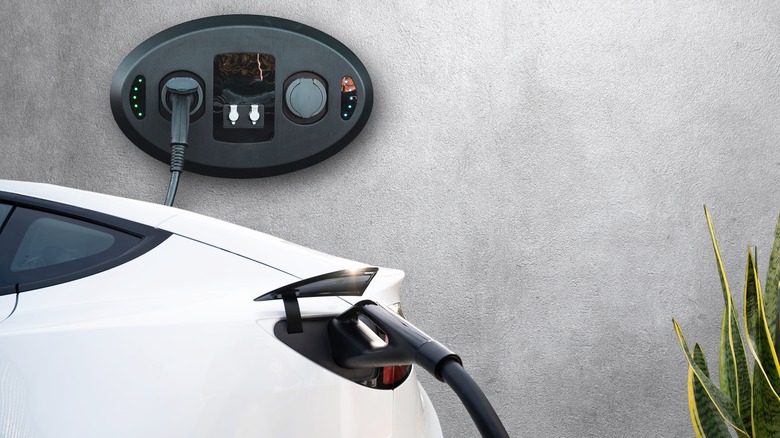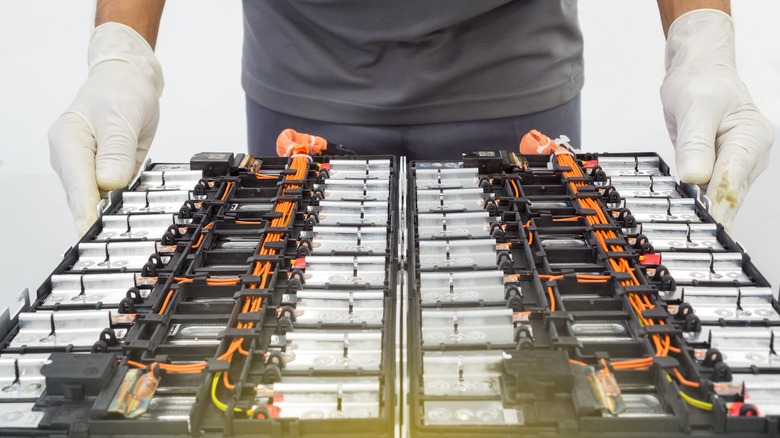The Surprising Costs Of Maintaining An Electric Vehicle
Sales of electric vehicles are climbing rapidly, which is no surprise given the recent wild fluctuations in gas prices and the numerous tax credits available to EV buyers. Electric vehicle purchasers are also motivated by environmental concerns, but buying an EV isn't all about tax breaks and saving the planet. There are some hidden costs to both a buyer's wallet and the environment that should be considered before shelling out for a Tesla or a Prius.
One very important consideration will be how to upgrade the electrical system in your home to charge your vehicle. While an ordinary 120-volt household outlet can be used to charge most EVs, this will only provide a few miles of driving range per hour of charging time. For more regular use, many EV users opt to install a 240-volt Level 2 charger at a cost of around $1000. A Level 2 charger can provide from 10-60 miles of range per hour of charging time, depending on amperage. Businesses can opt for a 480V Level 3 charger, which can cost upwards of $150,000 but will fully charge some EV batteries in under an hour. Of course, EV owners also have to pay for the energy used to charge their batteries.
Tires for some EVs can be costly
Charging infrastructure is just one added cost of owning and operating an electric vehicle, however. Some EVs come equipped with expensive low-profile tires that are prone to blowouts and can cause sticker shock for owners when it comes time to replace them.
The Tesla Model 3 comes with 235 mm Michelin Pilot Sport tires on 18-inch wheels. They retail for $243.99 each at Tire Rack. That means when it's time to re-shoe your Tesla, you'll be out more than a thousand dollars once you pay sales tax and costs for mounting and balancing.
Even lower-end EVs come with pricey tires. The most frugal option available for a 2023 Toyota Prius will still set you back nearly $700 for a full set, and going for Michelin's Primacy All-Season rubber for your Prius bumps that cost up past the $1,000 mark. Like any other vehicle, an EV requires a certain amount of routine maintenance to keep it on the road and running safely. According to RepairPal, for Tesla models, those costs run about $832 per year, which is a little above the $652 average for all US models.
Battery replacement and disposal
After repeated cycles of charging and discharging, EV batteries lose their capacity and will eventually need to be replaced. While the replacement of most EV batteries may be covered under the car's warranty, out-of-pocket costs could potentially run into thousands of dollars for some EV owners.
Along with the potential monetary cost of replacing depleted EV batteries are the often overlooked environmental costs of producing the batteries, particularly when it comes to mining the rare earth materials required to manufacture them. To produce enough lithium for about 100 car batteries requires nearly 2 million tons of water and almost 2/3 of Chile's water is currently being used to extract lithium. One way in which the environmental impact of EV battery manufacturing can be greatly lessened is by recycling the rapidly growing supply of lithium-ion batteries.
Dr. Paul Anderson of the University of Birmingham told the BBC that shockingly few EV batteries now find their way into recycling centers. "Currently, globally, the value everyone quotes is about 5%," he said. "In some parts of the world, it's considerably less."
So while some of the burdens will fall to the purchaser and some will be spread globally, owning an electric vehicle certainly comes with some hidden costs that should be considered before taking the EV plunge.


